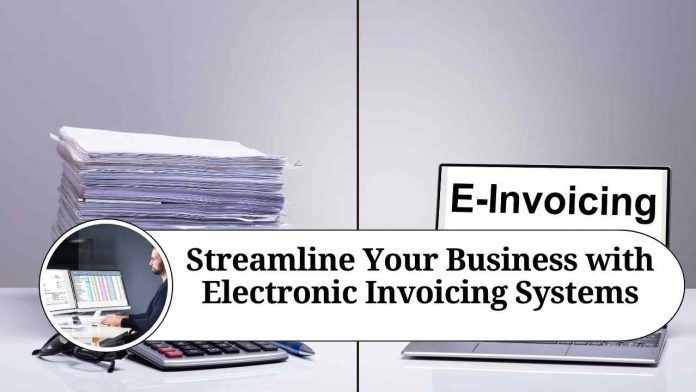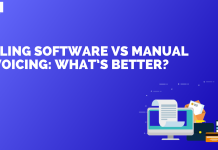Introduction
In today’s fast-paced digital world, businesses are constantly seeking ways to improve efficiency and streamline their operations. One area where significant improvements can be made is in the invoicing process. Traditional paper-based invoicing systems are not only time-consuming but also prone to errors and delays. Fortunately, electronic invoicing systems have emerged as a game-changer, offering numerous benefits for businesses of all sizes. In this blog post, we will explore electronic invoicing systems and discuss how they can revolutionize your business operations.
What is Electronic Invoicing?
Electronic invoicing, also known as e-invoicing, is the process of creating, sending, and receiving invoices electronically, eliminating the need for paper-based invoices. It involves the use of digital documents and automation tools to generate, deliver, and manage invoices seamlessly. Electronic invoicing systems leverage technology to streamline the entire invoicing process, from creation to payment, making it more efficient, accurate, and cost-effective.
Advantages of Electronic Invoicing Systems:
2.1 Enhanced Efficiency: Electronic invoicing systems automate various tasks, such as invoice generation, distribution, and payment reconciliation. This automation eliminates the need for manual data entry and reduces the chances of errors and discrepancies. With electronic invoicing, businesses can significantly speed up the entire invoicing cycle, leading to faster payment processing and improved cash flow.
2.2 Cost Savings: Paper-based invoicing systems come with various costs, including printing, postage, and storage expenses. By switching to electronic invoicing, businesses can eliminate these costs and save a significant amount of money in the long run. Additionally, electronic invoices reduce the risk of lost or misplaced documents, avoiding potential penalties and late payment fees.
2.3 Accurate Financial Data: Electronic invoicing systems integrate seamlessly with accounting software, ensuring accurate and up-to-date financial data. The automated data entry eliminates the risk of manual errors and enables real-time tracking of invoices, payments, and outstanding balances. This data visibility allows businesses to have better control over their financial operations and make informed decisions.
2.4 Faster Payment Processing: With electronic invoicing, businesses can send invoices directly to their customers’ email inboxes. This eliminates postal delays and ensures prompt delivery of invoices. Moreover, electronic invoicing systems often support online payment options, allowing customers to make payments instantly, further speeding up the payment collection process.
2.5 Improved Customer Relationships: Electronic invoicing systems enable businesses to provide a seamless and convenient experience to their customers. With electronic invoices, customers can easily access and review their invoices, track payment statuses, and resolve any billing issues promptly. This streamlined and customer-centric approach enhances satisfaction and builds stronger relationships with clients.
Compliance and Security:
Electronic invoicing systems adhere to strict compliance standards and ensure data security. These systems often use encryption technology to protect sensitive financial information during transmission. Furthermore, electronic invoices are stored in secure digital repositories, reducing the risk of document loss or unauthorized access. With electronic invoicing, businesses can comply with regulatory requirements while safeguarding their financial data.
Conclusion
In today’s digital age, electronic invoicing systems have become an indispensable tool for businesses aiming to improve efficiency, reduce costs, and enhance customer satisfaction. By embracing electronic invoicing, businesses can streamline their invoicing processes, accelerate payment collections, and gain better control over their financial operations. As technology continues to advance, electronic invoicing systems will only become more sophisticated and offer additional benefits. Therefore, it’s high time for businesses to adopt electronic invoicing systems and take advantage of the many opportunities they present.
Read more useful content:
Frequently Asked Questions (FAQs)
Q. What is electronic invoicing?
Electronic invoicing, or e-invoicing, refers to the process of creating, sending, and receiving invoices electronically, eliminating the need for paper-based invoices. It involves the use of digital documents and automation tools to streamline the invoicing process and improve efficiency.
Q. How does electronic invoicing work?
Electronic invoicing systems use technology to generate invoices in a digital format, typically using standardized formats such as PDF or XML. These invoices are then sent electronically to the recipient via email, a secure online portal, or a dedicated electronic data interchange (EDI) network. The recipient can review the invoice, make online payments if supported, and track payment status.
Q. What are the benefits of electronic invoicing systems?
Electronic invoicing systems offer several benefits, including:
Enhanced efficiency and faster payment processing.
Cost savings by eliminating printing, postage, and storage expenses.
Accurate financial data and real-time tracking of invoices.
Improved customer relationships through a seamless invoicing experience.
Compliance with regulatory standards and enhanced data security.
Q. Is electronic invoicing secure?
Yes, electronic invoicing systems prioritize data security. They often use encryption technology to protect sensitive financial information during transmission. Additionally, digital repositories provide secure storage for electronic invoices, reducing the risk of document loss or unauthorized access.
Q. Can electronic invoicing systems integrate with accounting software?
Yes, many electronic invoicing systems integrate seamlessly with popular accounting software. This integration allows for automatic synchronization of invoicing data, real-time updates on payment status, and streamlined financial reporting.
Q. Do electronic invoices have legal validity?
Yes, electronic invoices have legal validity in most countries. Governments around the world have established regulations and frameworks to ensure the authenticity and integrity of electronic invoices. It is important to comply with the specific legal requirements of the jurisdiction in which the business operates.
Q. Can electronic invoicing systems handle international invoicing?
Yes, electronic invoicing systems can handle international invoicing. They often support multiple languages, currencies, and tax regulations, allowing businesses to generate compliant invoices for their international clients.
Q. Are electronic invoicing systems suitable for small businesses?
Yes, electronic invoicing systems are beneficial for businesses of all sizes, including small businesses. They can help small businesses save time, reduce costs, and improve cash flow by streamlining the invoicing process and accelerating payment collections.
Q. Can electronic invoicing systems be customized to match my brand?
Yes, many electronic invoicing systems offer customization options, allowing businesses to personalize their invoices with their logo, colors, and branding elements. This helps maintain a consistent brand identity across all customer interactions.
Q. How do I choose the right electronic invoicing system for my business?
When choosing an electronic invoicing system, consider factors such as ease of use, integration capabilities, compliance with legal requirements, scalability, customer support, and cost. Evaluate different options, read reviews, and consider your business’s specific invoicing needs before making a decision.




















